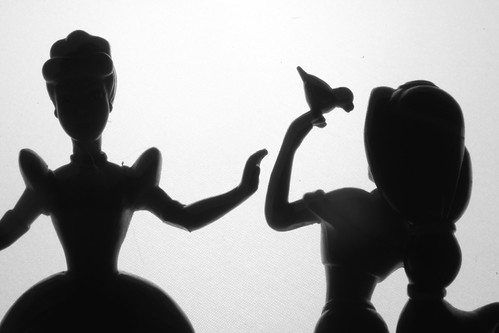 |
| Photo by kevindooly |
I created Arianna when I was fifteen, and role-played her with my friends Adryn and Merilee in what I suppose you could consider a very early version of the first book's plot--kidnapped princess who gets help from a slave and a mage, and who risks her own life to save the slave when he is recaptured. I think there were dragons, demonic wolves, and lots of convenient way-houses/caves in some of those early RPs. I'm relieved no longer to have the files.
We moved on to other worlds and characters, but something of Arianna's essence stuck with me, her stubbornness and pride, her kindness and idealism, brewing in my head with her sweet, stuttering ex-slave of a love-interest, who inadvertently learns to use Magic. One day in my senior year of High School (when I was eager to write anything that wasn't a college application essay), I started The Mark of Flight. By then, I had a pretty good idea who Arianna was.
Helena, on the other hand, was little more than a name and a goal. I didn't know what she looked like, I didn't know who her family was or her background, and I knew nothing about her personality. I wrote a version of the opening scene as a writing prompt for one of Holly Lisle's mini workshops, and couldn't get it out of my head. The day before NaNoWriMo, I wrote an outline--at that time I was unemployed and feeling a little worse than useless, so I figured if I was going to be a jobless moocher, I might as well be a jobless moocher with a word-count.
 |
| Picture by mrhayata |
Helena was a more active character to write from the beginning, and easier in many ways because she was modern, and had clear priorities. The problem was, I didn't know her. She was gray matter, condensing into something more concrete as my idea for the story expanded, evolved, and delineated specific requirements. By the time I'd gotten to the end...ohh, boy. All the characters were different, but Helena more than anyone. That spiraling mass of gray matter had finally condensed into a star, but her side-winding trail through the first draft of my story left a detritus of obsolete character actions and scenes.
Arianna, on the other hand, had come into her story almost as wise as she left it--definitely not what you want from a fourteen-year-old princess out in the wilds of her own country for the first time.
For both of these characters, I first had to find their ending-points before I could really decide their beginnings. When I was in school, I always wrote my essays straight through, and then pasted my conclusion into the beginning, so that it looked like my meandering path to the point was intentional. Sometimes, I'd even go back and fix the rest of the essay to more concisely reflect that. Thankfully, I'm a more diligent writer than I was a student.
What I discovered for my characters was that, once I knew who they were when they exited the story, I could use that essence of character and take them backwards a few steps, logically, based on what happens in the story. I could decide for them a stage from which to grow, and change, and develop into that character I had finally come to know by the end. In short, I messed with the starting-point of their character-journey to make the road to their destination more poignant and noticeable.
What kind of things do you learn about your characters in a first-draft? How do your characters' personal journeys evolve and change as you write, and from draft-to-draft? Would you/have you made changes to a story because of a character's need to be dynamic?
